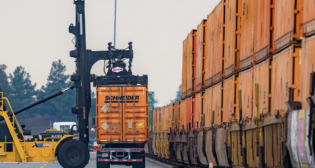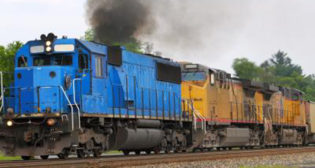
Takeaways From Cowen’s Rail Equipment and Crude Oil Tank Car Call
Written by William C. Vantuono, Editor-in-Chief“Storing oil in tank cars may be theoretically possible, but logistical, economic and regulatory hurdles make it unviable. Railcar lease rates could be 25-30% below 2019. Manufacturing inquiries have continued, but prospective buyers are in no rush to pull the trigger.” Those are the key takeaways from a conference call moderated by Cowen and Company Freight Transportation Analyst Matt Elkott. Among the industry experts participating were Railroad Financial Corp. President and Railway Age Financial Editor David Nahass, National Steel Car Senior Vice President Marketing and Sales Bob Pickel, and Oliver Wyman Vice President Jason Kuehn.
“One of our expert panelists described the logistics of storing large quantities of crude oil in tank cars as ‘a nightmare waiting to happen,’” Elkott notes. “Industry experts point out that the federal Hazardous Material Regulations (HMR) govern the transportation of hazardous materials, such as crude oil, at least until it is delivered to a private track over which the railroad does not exercise any control. As such, if a railroad leases access to any sidetracks for crude oil storage, it can no longer use them, as the lessee would need to have exclusive use. Moreover, federal regulations generally discourage industry stakeholders from storing crude in tank cars for longer than 48 hours. The railroads themselves have not shown a strong appetite for entertaining the idea, which appears to be a ‘fringe play,’ as our expert panelist described it, rather than something proposed by big corporations.
“Railcar manufacturing inquiries appear to have continued in April despite the economic shutdown. But translation into orders is very slow, and when it does occur, orders are not for delivery any time soon. This could mean a significant plunge in industry orders in 2Q2020, unless the pace of reopening the economy picks up significantly in May and June. While a big 2Q order drop would not come as a surprise, we believe one wildcard is the possibility that some lessors would take advantage of depressed demand conditions to sign sizable long-term supply agreements, which would typically register as orders with the OEMs. Such agreements would likely be done at favorable prices to the buyer and include a good deal of flexibility to switch car types based on market demand at the time the agreement is exercised.
“Average spot lease rates for a hypothetical, highly diversified lease fleet may be 25% to 30% below the same time last year, according to an expert panelist with unique insights into the leasing market. While railcar secondary market valuations have remained relatively resilient in recent downturns, they may have eased a bit more in the current one. That said, we do not foresee them falling off a cliff, as some financial investors may still look for hard assets to deploy capital to amid dwindling yield alternatives.
“We are constructive on TrinityRail as we believe its ongoing transition into being primarily a lessor will enable the company to also become a more disciplined manufacturer. We think the economic challenges presented by the coronavirus pandemic could bring to the forefront any cost-cutting and permanent capacity reduction plans in the manufacturing segment.
“We rate GATX Market Perform based on what we see as largely fair valuation at current levels. That said, concerns about the aircraft spare engine business, which had been expected to have an outsized contribution to earnings this year, are well documented, in our opinion, and the company’s railcar leasing business is somewhat protected by lease terms. Additionally, railcar secondary market valuations, while likely not as resilient as other recent downturns, could remain relatively solid, as financial investors look for hard assets to deploy capital to amid dwindling yield alternatives and elevated risk elsewhere. All these factors could potentially help the stock in the near term, or at least limit significant downside from this point.
“We rate Greenbrier Outperform based on several factors, including the following: 1. The company’s improved market position following the ARI deal. 2. We believe that, due to the rolling nature of the coronavirus infection apexes, Greenbrier’s international diversification could help mitigate the blow of the pandemic somewhat. 3. Solid execution, including in the recently reported fiscal 2Q2020. 4. Compelling valuation.”



